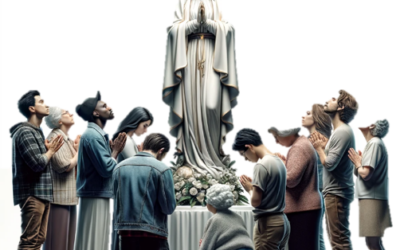An indulgence, according to the Roman Catholic Church, is a means of remission of the temporal punishment for sins which have already been forgiven but are due to the Christian in this life and/or in purgatory. This punishment is most often in purgatory but can also be suffered in this life. An indulgence removes the time needed to be spent in purgatory. There are two kinds of indulgences: partial and plenary. A partial indulgence removes part of the punishment of sins. A plenary indulgence removes all of the punishment of sins. Granting an indulgence of a certain number of days or years means that is how many days or years is removed from the time of punishment a person must undergo in purgatory.
On the inside of the cover of the New St. Joseph Baltimore Catechism published in 1969 there is a prayer. After the prayer, it says the following: “An indulgence of five years. A plenary indulgence on the usual conditions provided this prayer has been recited daily for a month.” This means that by saying the prayer properly, five years is removed from a person’s time in purgatory!
On the same page of the New St. Joseph Baltimore Catechism it says, “The faithful who devote 20 minutes to a half-hour to teaching or studying Christian doctrine, may gain: an indulgence of three years. A plenary indulgence on the usual conditions twice a month, if the above practice is carried out at least twice a month.”
So, we can see that according to this catechism if you say the prayer properly, you can have five years removed from your time in purgatory. Likewise, if the faithful devote 20 minutes to a half-hour to teaching or studying Christian doctrine, they can have three years removed from purgatory. Is this biblical? Not at all. It is ridiculous to think that reading doctrine and saying a prayer removes time of punishment in the Catholic-invented place called purgatory. It is nothing more than a means to control the Catholics and keep them dependent on “The Mother Church.”
The treasury of the church
The Treasury of the Church is a storehouse of merit that has earned the sacrifice of Christ and the prayers and good works of the Virgin Mary and all the saints. This reservoir of merit is drawn upon and applied to Roman Catholics via the Roman Catholic Church so that their future duration of punishment might be reduced. So, essentially what we have is a system where merit is dispensed through the Roman Catholic sacraments and priesthood.
“We also call these spiritual goods of the communion of saints ‘the Church’s treasury’, which is “not the sum total of the material goods which have accumulated during the course of the centuries. On the contrary, the ‘treasury of the Church’ is the infinite value, which can never be exhausted, which Christ’s merits have before God. They were offered so that the whole of mankind could be set free from sin and attain communion with the Father. In Christ, the Redeemer himself, the satisfactions and merits of his Redemption exist and find their efficacy,” Catechism of the Catholic Church, 1476)
“This treasury includes, as well, the prayers and good works of the Blessed Virgin Mary. They are truly immense, unfathomable, and even pristine in their value before God. In the treasury, too, are the prayers and good works of all the saints, all those who have followed in the footsteps of Christ the Lord and by his grace have made their lives holy and carried out the mission in the unity of the Mystical Body,” Catechism of the Catholic Church, 1477).
In short, this treasury of the church of Rome is a means by which it keeps its people dependent upon its sacramental, ecclesiastical system. Without participation in Roman Catholic Sacraments, future punishment will be far more extensive. The Roman Catholic Church keeps its people coming back to it, dependent upon it, needful for the dispensing of the treasury of merit that it has at its disposal. Instead of the Roman Catholic being completely sanctified and justified in Christ, by the work of Christ on the cross, the very propitiation offered by the Lord in his sacrifice is usurped by the Roman Catholic Church. The power and priesthood and mediatorship of Christ are replaced by that of the Roman Catholic Church, and it becomes the means by which the so-called people of God are relieved of their sin punishment. This is a blasphemous claim of Rome that detracts from the power and glory and sufficiency of the cross. All Roman Catholics should stop looking to the church as its means of salvation and/or as a means of deliverance from punishment. Instead, the Roman Catholic should look to Christ alone through faith alone for the forgiveness of his/her sins.
- “Therefore we conclude that a man is justified by faith without the deeds of the law,” (Rom. 3:28).
- “For what saith the scripture? Abraham believed God, and it was counted unto him for righteousness,” (Rom. 4:3).
- “But to the one who does not work, but believes in Him who justifies the ungodly, his faith is reckoned as righteousness,” (Rom. 4:5).
- “Therefore being justified by faith, we have peace with God through our Lord Jesus Christ,” (Rom. 5:1).
- “Much more then, having now been justified by His blood, we shall be saved from the wrath of God through Him,” (Rom. 5:9).
- “For by grace are ye saved through faith; and that not of yourselves: it is the gift of God,” (Eph. 2:8).
The problem with indulgences
The obvious problem with indulgences is that they negate the all-sufficiency of the cross. It was Jesus who took our punishment. He took our place so that we do not have to suffer any punishment for our sins so that we might be made right with God. We are not saying that sins do not have consequences and punishments. We are saying that being made right with God is not by our suffering but by Christ’s.
“Surely our griefs He Himself bore, and our sorrows He carried; yet we ourselves esteemed Him stricken, smitten of God, and afflicted. 5 But He was pierced through for our transgressions. He was crushed for our iniquities. The chastening for our well-being fell upon Him, and by His scourging we are healed. 6 All of us like sheep have gone astray. Each of us has turned to his own way. But the Lord has caused the iniquity of us all To fall on Him,” (Isaiah 53:4-6).
The Second Vatican Council, p. 63, mentions purgatory as a place of punishment for our sins: “The truth has been divinely revealed that sins are followed by punishments. God’s holiness and justice inflict them. Sins must be expiated. This may be done on this earth through the sorrows, miseries, and trials of this life and, above all, through death. Otherwise, the expiation must be made in the next life through fire and torments or purifying punishments.” Indulgences only have value in Catholicism due to the unbiblical teaching of purgatory, which the Roman Catholic Church teaches is a place of punishment where people expiate their own sins there (CCC, 1475).
Expiation is “a term associated with the removal, cleansing, or forgiveness of sin.”1 But how does a person expiate or cleanse himself of his own sins? He doesn’t. If there were a means by which we could cleanse ourselves on our own sins, then God would have provided that.
“I do not nullify the grace of God; for if righteousness comes through the Law, then Christ died needlessly,” (Gal. 2:21).
Nevertheless, out of the teaching of purgatory and temporal punishment comes the teaching of indulgences – a means by which punishment for sin is reduced through a person’s own sufferings. How horrible is this teaching since it reduces the power and glory of the cross and says we can expiate our own sins instead of trusting in Christ alone for this? The Roman Catholic Church needs to recant its false teaching and urge its people to look to Christ alone and not to its mediatorship, its priesthood, its treasury of merit, its sacraments, or its rules and regulations for the salvation of souls.
The indulgences’ practice is not a biblical teaching and should be avoided as an insult to the sufficiency of Christ’s sacrifice on the cross.
References
| 1↑ | Achtemeier, Paul J., Harper’s Bible Dictionary, San Francisco: Harper and Row, 1985. |
|---|





